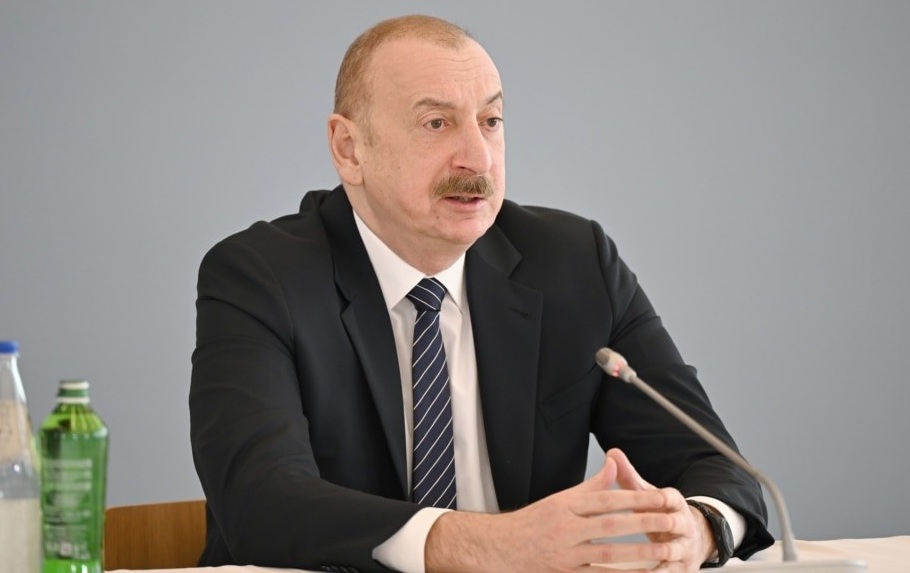Baku accuses Europe of ‘colonialism’
Aliev's resentment towards the Europeans motivated by what he percieves as an ‘attempt at interference’ in Georgia's affairs is also being transmitted to Azerbaijan, through ‘human rights NGOs and the flow of capital connected to them’. He also heaps praise on Tbilisi for having introduced the law on ‘foreign influences’.
Baku (AsiaNews) - The President of Azerbaijan, Ilham Aliev, spoke at the Baku forum on the theme of the ‘New World Order’, with a series of statements on Georgia and criticising the European Union and the European Council. In his opinion, ‘the attitude of the European Commission towards Georgia's internal processes is absolutely unacceptable, it is the behaviour of colonisers, who try to look at the will of the Georgian people through the prism of the colonial past’, expressing the closeness of the Azeris to the Georgians and the government of Tbilisi, as “Georgia's internal issues must be decided by the Georgian people, not by bureaucrats in Brussels”.
Speaking of the Council of Europe, Aliev cited the situation in Azerbaijan as an example, where ‘the Europeans wanted to isolate and discriminate against us, but in fact they have isolated themselves from the Caucasus’, which is exactly what has happened with Georgia. The ‘colonial mentality’, according to the Azerbaijani president, is particularly evident ‘in those politicians who failed to get elected to the European Parliament and found a place in the Parliamentary Assembly of the Council of Europe, but their attitude is counterproductive’. In 2024, the members of the PACE assembly, which is based at the Palace of Europe in Strasbourg, refused to admit the Azerbaijani delegation due to ‘continuing human rights violations’ in the country, including the persecution of political opponents and the independent press, as well as the military aggression in Nagorno-Karabakh. In 2025 the same decision was made against the delegation of the ‘Georgian Dream’ party.
Alyev's resentment towards Europeans is motivated by the fact that, according to him, the attempt to interfere in Georgia's affairs is also transmitted to Azerbaijan through the activities of international non-governmental and humanitarian organisations, and the capital flows connected to them. The president states that ‘some Western organisations use very creative means to overcome the obstacles to bringing funds into our country, using various couriers who reach us via Georgia’, where they still have a certain amount of freedom of action through Georgian banks controlled by foreigners. These are ‘anonymous credit cards and cash, which are circulated to destabilise the situation’, and when the police pursue and arrest these ‘couriers’, then ‘they start accusing us of anti-democratic actions’, commented Aliev.
For this reason, US President Donald Trump is praised for closing USAID, the US Agency for International Development, even if ‘it is still an insufficient measure’, although USAID is considered ‘the number one monster, a totally corrupt organisation’, but it is necessary to go all the way. The closure of Radio Svoboda and Voice of America is also seen as very positive, but he asks that similar firmness be used to interrupt the activities of Human Rights Watch, Freedom House, Amnesty International, Transparency International, an ‘infrastructure of political enemies that must be totally annulled’.
Returning to the relations between Baku and Tbilisi, Aliev recalled that the first official visit abroad of Prime Minister Irakli Kobakhidze, after the parliamentary elections last November, was to Azerbaijan, where the new Georgian president Mikhail Saakashvili also intends to go, on his first trip abroad. In fact, the first visits have ‘great symbolic value, bearing witness to our friendship and mutual loyalty in international relations’. Aliev had repeatedly stated that ‘Georgia has been rather slow in controlling foreign funding of anti-government organisations and press’, but now things are starting to improve, after the introduction of the law on ‘foreign influences’ that caused the breakdown of relations with the EU, and the consolidation of the pro-Russian axis in the South Caucasus.
11/08/2017 20:05







.png)










